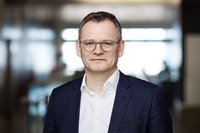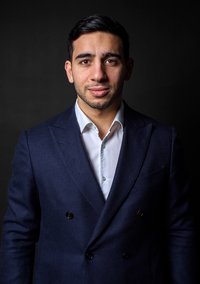Master's Degree Programme
| About the programme Language: English (See language requirements) | Place of study: Aarhus | Commencement: August / September (no winter intake) |
Management Accounting – also known as Management Control – is a fundamental aspect of business administration. Management Accounting is the primary language of business, and it creates the foundation for discussions of a company’s financial performance, as well as the non-financial dimensions of performance. Hence, Management Accounting is the sweet spot where numbers and data meet management and decisions.
Working with measurement and evaluation systems, the provision of incentives and adjustments of behaviour hold the potential for controlling cost and performance at all levels within an organisation, and thereby ensure value creation. You will be able to create transparency and financially sound solutions for a company by developing and analysing performance, cost and profitability. This skillset allows you to identify and solve potential strategic and operational problems in companies/organisations (private and publicly traded companies, governmental organisations, municipalities, hospitals, etc.) To deal with these problems, you will learn how to design and implement incentive, budgeting and performance management systems to coordinate and motivate departments, teams or individuals to change their behaviour and correct the situation.
To complement these analytical skills, you will also be introduced to ERP systems (SAP) and other IT software, e.g., business intelligence in Power BI.
In general, the MSc in Management Accounting and Control (MAC) (in Danish: Økonomistyring) will provide you with competencies within:
The MAC programme has a strong tradition of collaborating with companies, as companies have a very high demand for the skillset learned by students on the MAC programme. The MAC programme has more than 10 partner companies that include top consulting firms, manufacturers, retailers etc. These partnerships involve guest lectures, social events, awards and other interesting activities. We also collaborate closely with companies on internships, theses, project work, etc. Therefore, our programmes are based on theoretical foundation in combination with practical, real-world problems and solutions.
Applicants with a Bachelor's degree in Economics and Business Administration (HA) from Aarhus University have the right to be admitted to the Master's degree programme in Economics and Business Administration (cand.merc.) at Aarhus University on the condition that application is made for admission to the Master’s degree programme no later than three years after completion of the Bachelor’s degree programme. The legal right of admission requires receipt of the application by Aarhus University within the appropriate period of time.
The following Bachelor’s degrees fulfill the admissions requirements for the Master’s degree programme in Economics and Business Administration at Aarhus University but are not automatically secured a spot at the programme:
* With a diploma older than 2000, your Bachelor’s degree will be assessed according to the specific admission requirements described under the section: “Students that hold a degree from another university”.
Other Bachelor´s degrees can provide admission to the Master’s degree programme. When you apply the university will access if your Bachelor´s degree corresponds in level, extent and content to a BSc in Economics and Business Administration/HA from Aarhus Universitet. The assessment will prioritize the sufficient content of the following subjects and ECTS-points:
Subject | ECTS |
Methods* | 15 ECTS |
Marketing | 7,5 ECTS |
Finance | 7,5 ECTS |
Accounting | 7,5 ECTS |
Organisation- and Leadership Theory | 7,5 ECTS |
Microeconomics | 5 ECTS |
Operations Management | 5 ECTS |
Additional ECTS points within the abovementioned areas | 25 ECTS |
Total ECTS within Economics and Business Administration | 80 ECTS |
*Please note, applicants must have at least 15 ECTS within methods including at least 10 ECTS within quantitative methods or statistics. However only 5 ECTS can be covered by Mathematics.
In order to meet the admission requirements for the MSc programmes in Economics and Business Administration, applicants with a specific professional bachelor’s degree must have completed specific elective courses as part of their qualifying exam. In this table the requirements for elective courses are laid out.
As English is the language of instruction in all subjects, all applicants are required to provide evidence of their English language proficiency.
Please see the page on language requirements.
If you apply for admission with an international Bachelor's degree, you must fill in this appendix and upload it in the application portal. The appendix serves to help the Admission Board assess your Bachelor's degree in regard to the admission requirements.
As from the intake 2022, the Master’s degree programmes in Economics and Business Administration (cand.merc.) only admits a limited number of students each year. Therefore, meeting the admission requirements does not in itself guarantee admission to the programme.
Please note, for programmes with restricted admission special rules regarding supplementary Bachelor’s courses apply. Therefore, we no longer offer pre-assessments for the programme in Economics and Business Administration (cand.merc.).
Read more about supplementary Bachelor’s courses.
If there are more qualified applicants than available seats, the Admissions Committee assesses each applicant based on the average mark (i.e. GPA) of the Bachelor’s degree at the time of application. Marks/grades obtained after the application deadline will not be included in the GPA. The Admissions Committee assesses each applicant’s marks based on the information provided by diplomas and transcripts.
ACADEMIC REGULATIONS
The study programme consists of two semesters in the first year which cover the compulsory courses in the programme specialisation and two semesters in the last year which are reserved for the student's own specialisation.
In the first semester you follow the prerequisite courses that form the methodological and academic basis for the further study programme.
In the second semester you follow the specialisation courses of the programme.
In the third semester you can choose elective courses within your areas of interest. The courses can either be taken at Aarhus BSS during the semester, at the Summer University or at one of our more than 300 partner universities abroad. You can also participate in project-based internship programmes either in Denmark or abroad.
The fourth semester is devoted to the final thesis. You may choose the topic of the thesis freely and so get a chance to concentrate on and specialise in a specific field of interest. The thesis may be written in collaboration with another student or it may be the result of your individual effort.
At Aarhus BSS, we conduct research at the highest academic level.
All researchers employed are engaged in research projects covering a wide range of different subjects and focusing on knowledge and skills considered essential for professional business activities in the global marketplace. All faculty have both research and teaching responsibilities which means that our teaching is continually based on the latest research results.
Aarhus BSS is very internationally oriented. The broad scope of our research activities and educational programmes enable us to attract researchers, teachers, and students from all over the world, and this creates an international environment for research and learning in which academic views are exchanged, experiences are gathered and friendships are formed.
Aarhus University is a leading university in Denmark in building student exchange opportunities. The university encourages all students to spend time studying abroad. Every year, more than 700 students from Aarhus BSS go abroad to participate in exchange programmes around the world at our more than 300 partner universities. About the same number of students from all over the world come to participate in the exchange programme in Aarhus, and this contributes to a truly international learning atmosphere.
-experienced, photographed and filmed by the students themselves.
With thousands of pictures #AUInternational, #AarhusUni gives insight into the everyday life as a student at AU; the parties, procrastination, exams and all the other ways you’ll spend your time at university.
The photos belong to the users, shared with #AUInternational and #AarhusUni.
The chart shows the five most common types of work for graduates 1-2 years after finishing their degree. The data is derived from a survey made by Epinion for the Ministry of Higher Education and Science and Aarhus University in 2020.
Decisions and leadership based on management accounting, including both financial and non-financial information, is critical to value creation within all organisations. Hence, there is a wide variety of job opportunities for graduates from the MAC programme.
You will have a multitude of career opportunities once you graduate, for example:
The Department of Management has a strong management accounting research group attached to the MAC programme.
The research-based MSc study programme in Economics and Business Administration builds on the competencies and insights acquired in the BSc study programme in Economics and Business Administration.
The study programme provides the graduate with specialist knowledge within the disciplines of the study programme, which gives the graduate high academic qualifications to develop solutions to issues pertaining to business administration in companies and organisations in the public and private sectors.
The study programme also qualifies the graduate for further studies, including PhD studies.
Through the study programme, the graduate has acquired knowledge that enables the graduate to
We want to help our students find successful careers. Students can always contact our Career Services for advice and assistance with getting onto the Danish labour market. Check out our careers page to see the range of services we offer.

1. What makes the Master’s degree programme in Management Accounting and Control unique from your perspective?
The MAC programme provides a unique combination of an understanding of numbers and how those numbers relate to an organisation. This combination is something that an increasing number of companies are looking for as we move into a world where finance becomes centred on value creation. Many standard financial programmes do not provide students with the toolbox they need to create value through different business models, strategies, performance management competences, managerial accounting skills, etc.
2. What competencies demanded by your company does the degree programme provide?
Our company needs finance people with a good toolbox in relation to finance processes, IT tools, performance management, budget/forecast, etc. However, we also have an increasing need for finance controllers who understand value creation, strategy, business, communication, etc. The latter competencies have been required at all levels within finance the last few years and not all programmes equip students to go beyond figures. MAC provides students with a solid understanding of the financial toolbox, but more importantly, that toolbox contains competencies within strategy, business, business models, etc.
3. What type of job function will a graduate from the Management Accounting and Control programme be able to fill at your company (or for your customers)?
People with an MSc in Management Accounting and Control will be able take up many positions either within or outside finance in our organisation. The roles within finance could be business analyst and then later on finance business partner or head of finance – both position with a direct link to the business. There is also the option of more technical roles working with digital transformation or business warehouse reports and processes. An example of a role outside finance could be strategy consultant for strategy and management processes.

1. What makes the Master’s degree programme in Management Accounting and Control unique from your perspective?
Management accounting is at the core of finance, and the Management Accounting and Control degree programme teaches you how to create business insights and drive company performance.
2. What competencies demanded by your company does the degree programme provide?
By combining concepts and theories within planning and budgeting and combining performance management and cost management with competencies in project management, graduates from the programme are trained to solve the challenges we see in the market.
3. What type of job function will a graduate from the Management Accounting and Control programme be able to fill at your company (or for your customers)?
We work within the entire CFO area and engage with clients to operate, optimise, and strategically transform their finance functions. Graduates take part in transformation projects where they support the client in all project phases from analysis to design and implementation. Our aspiration is to train the finance professionals and CFOs of tomorrow through a tailored and continuous development programme.

1) What makes the Master’s degree programme in Management Accounting and Control unique from your perspective?
The Master’s degree programme in Management Accounting and Control is unique because it provides students with a strong foundation in financial management and accounting, as well as data analysis and decision-making skills.
2) What competencies demanded by your company does the degree programme provide?
The competencies sought after by Danfoss that a graduate from the programme can provide are financial analysis and reporting, budgeting and forecasting, and the ability to interpret financial data and communicate insights effectively.
3) What type of job function will a graduate from the Master’s degree programme in Management Accounting and Control be able to fill at your company (or for our customers)?
A graduate from the Master’s degree programme in Management Accounting and Control will be able to take on roles such as financial analyst, management accountant, financial controller and much more at Danfoss. The programme also provides valuable leadership and project management skills that would be beneficial in various roles within our organisation. Our CFO is a graduate from the programme.